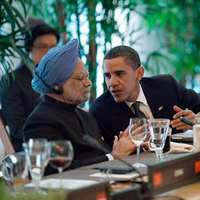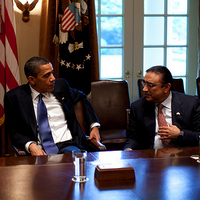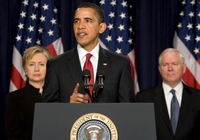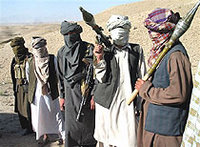Sri Lankan President Mahinda Rajapakse recently met with Chinese President Hu Jintao on the sidelines of an economic summit in St. Petersburg, Russia, where the two leaders pledged closer cooperation. In an email interview, Swaran Singh, a professor and chairman of the Center for International Politics, Organization and Disarmament at Jawaharlal Nehru University in New Delhi, discussed China-Sri Lanka relations. WPR: What is the recent history of China-Sri Lanka relations, and what is driving the relationship? Swaran Singh: China has been a major source of economic, military and technical assistance for Sri Lanka, which in turn supports China on its […]
South Asia Archive
Free Newsletter
Indian Foreign Minister S.M. Krishna recently visited Myanmar, the first high-level trip since Myanmar’s military junta installed a nominally civilian government last year. In an email interview, K. Yhome, a research fellow at the Observer Research Foundation in New Delhi, discussed India-Myanmar relations. WPR: What is the recent trajectory of India-Myanmar relations? K. Yhome: India-Myanmar relations have come a long way since New Delhi adopted a pragmatic approach toward Myanmar in the early 1990s. Even as relations began to improve with important initiatives taken to step up security and economic cooperation, such as joint military operations and border-trade measures, the […]

Against the backdrop of a sputtering economy and a spate of scandals battering India’s global image, Finance Minister Pranab Mukherjee is in Washington today. The visit — largely touted as a damage-control and public relations initiative — will see the senior minister meet U.S. Treasury Secretary Timothy Geithner and American industry leaders to reinforce the message that the Indian growth story is still robust and that the country remains an attractive investment destination. The timing of the Mukherjee-Geithner summit is also significant, as it takes place shortly before U.S. Secretary of State Hillary Clinton’s visit to New Delhi in July […]

The discovery of Osama bin Laden in Abbottabad, Pakistan, has raised uncomfortable questions about both Islamabad’s relationship with terrorism and Washington’s relationship with Islamabad. Even as the U.S. edges toward its goal of “disrupting, dismantling and defeating al-Qaida in Pakistan and Afghanistan,” a cocktail of other groups in Pakistan — Harakat-ul-Jihad ul-Islami (HuJI), Jaish-e-Muhammad (JeM) and Lashkar-e-Taiba (LeT) key among them — are ready to step into any void left by al-Qaida, often with official support. In fact, Islamabad has an economic incentive to keep them alive: As long as such groups are active, the U.S. will provide Pakistan with […]

President Barack Obama’s speech Wednesday evening announcing America’s policy toward Afghanistan in the coming year is another manifestation of his “Just Enough” doctrine, by which he takes “only those steps that are likely to produce a satisfactory outcome, rather than guaranteeing an optimal one.” It helps, of course, that Obama’s December 2009 West Point speech announcing the Afghanistan surge did not set very strict criteria for U.S. success. In his remarks two days ago, he reiterated those benchmarks: a U.S. effort designed “to refocus on al-Qaida; reverse the Taliban’s momentum; and train Afghan Security Forces to defend their own country.” […]
German Chancellor Angela Merkel recently paid an official visit to New Delhi, where she discussed Indo-German differences over U.N. Security Council reform, among other issues, with Indian Prime Minster Manmohan Singh. In an email interview, Rajendra K. Jain, professor of European studies at Jawaharlal Nehru University, discussed India-Germany relations. WPR: What is the recent history of Germany-India relations? Rajendra K. Jain: After several decades of “benign neglect” and mutual indifference, Indo-German relations have substantially improved and deepened in the past decade in nearly all fields, including a significant increase in high-level bilateral visits. A strategic partnership was established in 2001. […]

After almost two years of intensive lobbying by New Delhi, the Nuclear Suppliers Group (NSG) — the global watchdog of the sensitive nuclear trade — is finally considering India for membership. The issue has been incorporated as a special agenda item for discussion in the NSG plenary meeting scheduled for late June. The major member states, including the U.S., Germany, France and Britain, have all indicated their support for India’s candidacy. India’s quest for NSG membership raises serious questions for the nuclear nonproliferation regime, however. According to criteria set by the NSG, only signatories to the Nuclear Non-Proliferation Treaty (NPT) […]

The Obama administration appears to be in the throes of yet another debate about the long-term U.S. commitment to Afghanistan. Inside the administration, officials are weighing not only the material costs of remaining in Afghanistan, but also the political and bureaucratic implications of continuing the war. Undoubtedly, some are asking the question, “What would a withdrawal from Afghanistan say about the United States?” Some might answer that a withdrawal would embolden America’s enemies and indicate that the United States is both weak and unwilling to stand behind its friends. The late, esteemed George Kennan suggested another interpretation of such a […]
U.S. Defense Secretary Robert Gates’ visit to Afghanistan this week prompted contradictory reports about both the war’s progress and the likelihood for an accelerated troop withdrawal. Some observers said President Barack Obama’s security team was now considering the option of a swift pullout. Others quoted Gates as saying it’s too early to end combat. Meanwhile, a U.S. general touted success in training Afghan forces just as Congress released a report criticizing the Afghan nation-building program. Joshua Foust, a fellow and Afghanistan specialist with the American Security Project, tells Trend Lines that the conflicting reports are best explained by a widening […]

In recent weeks Taliban fighters have been handing over their weapons in record numbers in Afghanistan. This spike in the defection rate, perhaps motivated by Osama bin Laden’s death, has opened an important window of opportunity for U.S. and NATO forces fighting there. But so far the West has not been able to capitalize on this surge in Taliban defections effectively. In fact, in some cases, those interested in abandoning the insurgency and joining the government’s side are even being turned away. The failure to prioritize and generously fund defection and reintegration programs in Afghanistan poses a threat to the […]
